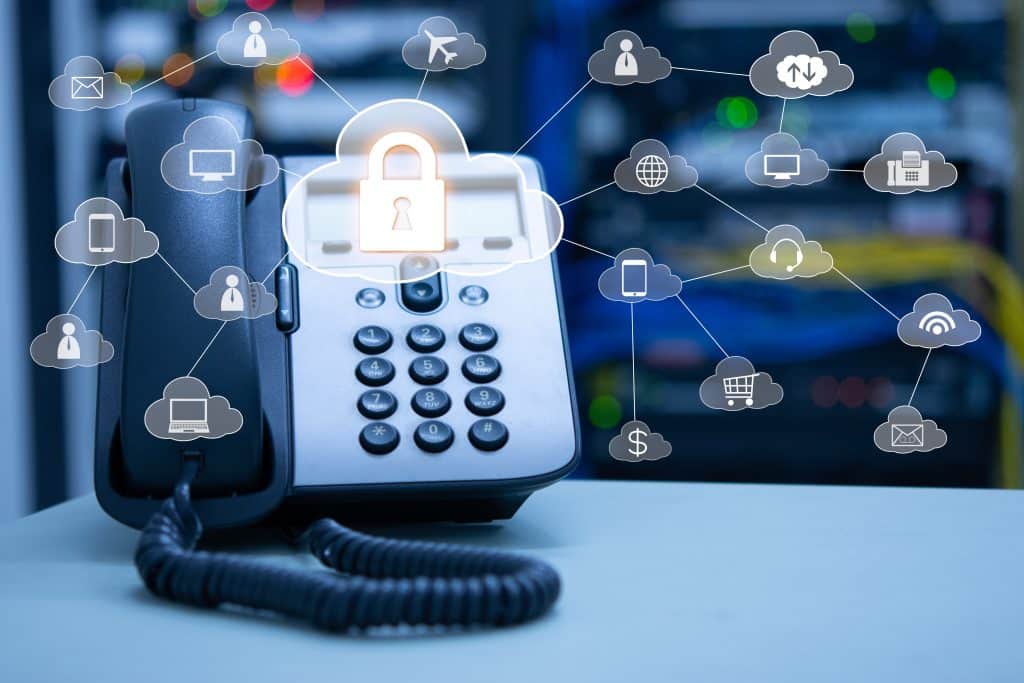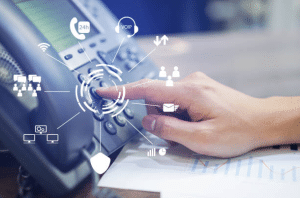VoIP Hacking: How it Works & How to Protect Your VoIP Phone
Tech Report is one of the oldest hardware, news, and tech review sites on the internet. We write helpful technology guides, unbiased product reviews, and report on the latest tech and crypto news. We maintain editorial independence and consider content quality and factual accuracy to be non-negotiable.
Voices over Internet Protocol (VoIP) phone systems are incredibly efficient and portable, replacing traditional setups in many businesses today. Although these systems offer multiple advantages regarding video, audio, and messaging capabilities, they also have drawbacks. Just like any other internet-enabled device, VoIP phones are susceptible to hacking. Due to the Internet of Things revolution, everything is done online. This makes verifying callers with the phone system challenging, potentially leading to future data breaches. Unfortunately, critical consumer data might be accessed if VoIP is used in an attack. Therefore, if your company has a VoIP system, you must take the necessary precautions to protect the VoIP phone against hacking. In this guide, you will learn everything about VoIP hacking. Such access allows the hackers to harm the company as they can listen to every call you make or answer. They can also make calls with your VoIP system (resulting in racking telephone bills) or makes some changes to your accounts. Sometimes, hackers compromise the systems to make international calls, impersonate executive text messages, and steal important and sensitive data from your company. They can also steal your client’s information like phone details, emails, and sometimes account details. An attack on IP telephony systems usually happens when information is unintentionally given to scammers. And 97% of all malware attacks are caused by this social engineering scam account. Notably, people working in the network operation center (NOC) and customer service are the high targets of hackers. They usually show up as clients to get data from you or representatives. That’s why there is a need to restrict the information available to clients to avoid hackers controlling their VoIP phone system. Also, it’s crucial to analyze and implement vital actions you and your provider may take to secure communications. One such step is staying current on how business phone systems are compromised. Due to its dependence on the internet connection and different installation processes, VoIP phone systems face many security risks. Here are some types of VoIP hacking: An unauthorized attack occurs when hackers make calls with your company’s phone system. The phone system is a target for hackers that utilize robocalling and auto-dialing software. When a caller answers your caller ID, they will hear a prerecorded message requesting action, such as credit card information, to “confirm the account.” Additionally, hackers can commit fraud by utilizing your authorized company phone service. Here are a few instances of fraudulent hacker actions: What’s the worst aspect? Since DIY configuration is probably what you are taking, unauthorized use of your VoIP system might go undetected. So, check your call history and records frequently, and create alerts if you exceed a specified threshold. With this, you’ll be alerted about unauthorized use immediately. In this type, hackers make international calls, which are very costly, and the bills will be on you. According to Trend Micro, toll fraud costs the nation an astounding $27 billion yearly. The attackers utilize phishing scams to target administrators and system users for illegal access to your company’s VoIP system. The hackers might start by messaging or voice mailing departments in your company, asking them to confirm specific information, such as bank data. The crooks will gain access if your staff answers the call and enters the verification codes, such as IP address and phone system password, without realizing they are hackers. After that, they call long-distance numbers without your permission using your VoIP system, racking up astronomical charges on your account. Caller ID spoofing is getting the originating station to appear as a different station on a caller’s caller ID instead of the actual calling station. This means some caller ID displayed on your phone might not be the actual caller ID. The caller’s identity might not always be confirmed via caller ID. Utilizing fake caller IDs (spoofing) with social engineering is a renowned modus-operandi for hackers. So, it’s advisable not to put 100% trust in caller ID when your cell phone rings. Unfortunately, most employees consider the caller’s identity a lot, exposing them to hackers who manipulate them into disclosing sensitive information, especially when they pose as their VoIP provider. Companies that take payment or share essential data via phone are at high risk of this hack attack and must take precautions to avoid eavesdropping. If you don’t know, hackers can record your real-time business phone call just like voicemails. Eavesdropping is likely to occur when your local network is compromised, or the connection is not encrypted. Also, insecure Wi-Fi networks (like those without c and Transport Layer Security) can attract invaders to observe the network. With this, VoIP Hackers wouldn’t ask you for your passwords to unlock items directly. They’ll quickly learn about a potential merger, a new product release, or a significant new hire or firing. With this ability, they can extort money from organizations and customers by threatening to reveal their sensitive information, sell your customers’ private information and trade secrets, or sell proprietary information to competitors. According to research, social engineering attacks were launched against 62% of firms in 2018. This VoIP attack is standard because it preys on humans rather than technology. To make their victims believe they are genuine, hackers strive to develop relationships with them. They call you pretending to be someone else while trying to deceive you into disclosing your private information. Attackers employ social engineering taking advantage of the fact that most people want to be kind. Additionally, there’s little knowledge of social engineering campaigns. Hackers exploit people’s emotions to get details about their target. They might even pressure your workers to act rashly and defy established protocol. With staff awareness of VoIP vulnerabilities, frequent training sessions on cloud-based telephony security, and proactive measures to fortify defenses, your business can defeat the majority of VoIP hacking. Below are defensive strategies that can help strengthen your VoIP system and prevent VoIP hacking. Choosing the right provider is the first step toward a secure phone system. Weak providers help hackers gain access to the system quickly. Therefore, before signing any contract with a VoIP company, review their security policy. There are certain things you should check before choosing a provider, such as; Investigate thoroughly and find out if your suppliers are certified. On request, they should be able to provide you with the following details. However, you can change to a different VoIP service if they don’t Anyone in charge of administrator access has complete control over every aspect of your company’s phone system. Users can control charging, participate in conference calls, add new lines, and generate more expensive incursions. It would be best to be cautious when granting staff administrative access to your VoIP phone system. Giving all your staff access makes a social engineering attack more likely. Although people can make mistakes, the correct permissions reduce the effects. Simply don’t grant administrative authority to those who don’t require it. Your phone calls are encrypted via a VPN. Your remote staff should set up a VPN on their computers and mobile. The VPN creates a strong link between the gadget and your phone system. It also ensures your staff isn’t leaking important data or accidentally using the unsecured Wi-Fi at their preferred coffee shop. So, instead of using their potentially vulnerable home network, they are making calls from your safe network. With this, hackers can’t eavesdrop on their calls. Furthermore, you can back it all up by preventing those phones from connecting to insecure or dubious websites using an endpoint filtering solution on your virtual private network. Endpoint filtering is a feature of the VPN. It is a technique used by VPN service providers to prevent the network from accessing websites that cause malware or discloses information like a public IP address to hackers. Also, it strengthens your internet connection and gadget integrity thoroughly. By often inspecting your network, you can find any VoIP security defects. To prevent compromise, administrators should constantly evaluate access and practices. For instance, you could find out your former employee still has an account or you haven’t changed your admin passwords in some years. You can also notice that your VoIP calls are not encrypted since the connection entry lacks Real-time Transport Protocol (SRTP) and Transport Layer Security (TLS). Moreover, conducting a security check annually is advisable to review and fix potential weaknesses. Also, you should monitor your call logs, as it is essential. Call logs show the history of outgoing and incoming calls your company makes. Note you should always check the date and time of calls, amount of calls made to a specific number, and the location of rings for both the customer and the company. It’s easy to discover hacks with these call logs. If you frequently monitor your VoIP phone system, you’ll spot anomalies that signal a hack. Like a call log, access shows who signs into your VoIP system. You can easily spot an unfamiliar IP address and spot when an administrator signs in at an unusual time. Your VoIP supplier provides a default password after you set up your service. Changing your password from the default option is a good option. However, it’s not always sufficient to protect your VoIP phone system. So, educating your team on the importance of secure passwords would be best. Avoid using easy and commonly used passwords and repeatedly using the same combinations. Credential stuffing is utilizing the same password repeatedly to gain access to your entire site. If hacker tracks the Facebook password of your customer care representative, they’ll use the same password on your VoIP phone system. Note, Each VoIP account must have a different password. Aim for lengthier passcodes rather than ones with unique characteristics to get a minimum character requirement. Furthermore, two-factor authentication is essential for your VoIP phone system. It offers another level of security. Users must verify their sign-in by saying a secret code, utilizing an authenticator app to scan a QR code, and utilizing their fingerprint ID. Even after acquiring your password, hackers won’t be able to access your VoIP system if you use these additional authentication methods. It permits only those with the proper second-step credentials. You can be susceptible to a VoIP hack if your system has one security flaw. The same idea also applies to your employees. If one inexperienced employee makes a mistake, it could result in a costly data breach in your company’s phone system. So, when you employ new staff, provide a brief cybersecurity training session. Also, Install a VPN on their devices, and educate them on VoIP breaches and the value of secure passwords. To prevent slack on your team, make it a priority. Ensure your team isn’t revealing a flaw in your phone system through their devices, especially if they’re utilizing them to place VoIP calls for work. A mobile device management strategy with the following information can help you with that: Furthermore, regardless of your security procedures’ effectiveness, you must always have a data breach response strategy. You will find the details of what to do in the event of an assault in this document. A plan for a disaster is also helpful. Most small firms that experience a disaster never reopen. However, planning might reduce the probability that your business will fail after a data breach. VoIP has shown to be a dependable business communication solution, but it does have several flaws, as mentioned above. So, learn more about the tactics hackers use to compromise VoIP phones. Also, educate your workers on these strategies and implement measures to avoid an occurrence, as it might be too costly to handle. Most importantly, comprehensively research your preferred VoIP provider to learn more about their security infrastructures and privacy policy. VoIP is a service of IP and a technology that lets users make voice calls using a broadband Internet connection rather than an ordinary (or analog) phone line. VoIP hacking is a technique that hackers use to gain access to your company’s phone system. The hackers can record conversations, run up large bills, and steal private data regarding your company and clients. The Secure Real-Time Transport Protocol (SRTP) encrypts VoIP calls using the Advanced Encryption Standard (AES) and protects your VoIP against hacks. You can know if someone hacked your VoIP by monitoring your call and access logs frequently. If you have a VoIP phone, you can ask your provider to run a CNAM lookup to find out information on the hacker. Dan Mabry has a deep passion for technology. Embarking on his writing career in 2020, he has consistently provided valuable insights to leading technology publications. Dan hones his boxing skills at the local club when not immersed in digital technology. He is preparing himself for a robot-dominated future. On Tuesday (July 16), Elon Musk announced that he’s moving the headquarters of his companies X and SpaceX from California to Texas. While SpaceX is moving to Starbase (a company... AI startup Anthropic and its biggest investor Menlo Ventures are launching a $100 million startup fund that will be used to back new startups. Menlo will supply the cash to invest... REGULATION & HIGH RISK INVESTMENT WARNING: Trading Forex, CFDs and Cryptocurrencies is highly speculative, carries a level of risk and may not be suitable for all investors. You may lose some or all of your invested capital, therefore you should not speculate with capital that you cannot afford to lose. The content on this site should not be considered investment advice. Investing is speculative. When investing your capital is at risk. Please note that we do receive advertising fees for directing users to open an account with the brokers/advertisers and/or for driving traffic to the advertiser website. Crypto promotions on this site do not comply with the UK Financial Promotions Regime and is not intended for UK consumers. © Copyright 2024 The Tech Report Inc. All Rights Reserved.

What is VoIP Hacking?
Types of VoIP Hacking
Unauthorized Usage and Access
Toll Fraud
Spoofing
Eavesdropping for Corporate Espionage, Theft, or Other Purposes
Social Engineering
Defensive Strategies to Strengthen VoIP

Select the Right VoIP Provider
Control Administrator Access
Utilize a VPN for Remote Access and Enable Endpoint Filtering
Test Your Network, Monitor Calls Logs, and Access Logs
Build a Strong Password and Use Two-factor Authentication
Train Your Staff on Cybersecurity
Have a Mobile Device Management Policy and a Response Plan in Case of Breaches
Conclusion
FAQ
What is VoIP tech?
What is VoIP hacking?
Is VoIP encryption possible?
How do I know my VoIP system is being hacked?
Our Editorial Process
Dan Mabry
Writer
Dan Mabry
Writer
More VoIP Services GuidesView all
Latest News
Elon Musk to Move X and SpaceX Headquarters from California to Texas
AI Startup Anthropic and Menlo Ventures Join Hands to Launch a $100 Million Startup Fund












